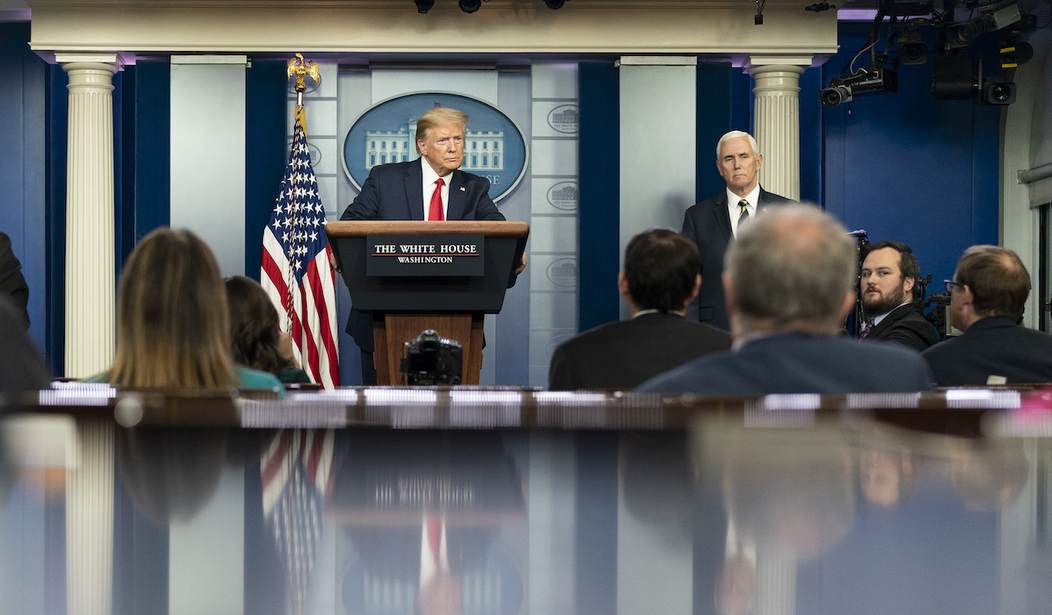Back in March, I pushed back hard against a growing anti-Trump media narrative that President Trump's Coronavirus task force press briefings shouldn't air live, or perhaps even be covered at all. At the time, many journalists voiced concerns about the veracity and newsworthiness of the daily ritual, but it seemed pretty clear that some were simply upset that the briefings appeared to be boosting the president's image; ratings were high, and his approval numbers experienced a bump. But as the sessions continued day after day -- often dragging on for more than an hour, featuring sniping and petty mutual hostility between Trump and reporters -- the diminishing returns effect swung into play.
The president was urged to curtail the press conferences in early April, make them shorter and more focused, and designate more responsibility. He initially panned such advice but ended up adopting it weeks later when it became clear that the spectacle was becoming a political liability. It didn't last. The daily briefings were halted shortly thereafter. But now that public polling shows that his handling of the Coronavirus crisis has become a clear and present threat to his re-election, with a consensus within GOP circles emerging that the president needs to do more to demonstrate proactive interest and leadership on the issue, calls to bring back the press conferences started to percolate. And yesterday, POTUS pulled the trigger. They're coming back:
TRUMP SAYS CORONAVIRUS BRIEFINGS LIKELY TO BEGIN TOMORROW
— *Walter Bloomberg (@DeItaOne) July 20, 2020
HE WILL LEAD VIRUS BRIEFINGS STARTING TOMORROW 5 PM
President Trump to bring back Coronavirus Task Force Press Briefing
— Mona Salama (@MonaSalama_) July 20, 2020
"It’s a great way to get information out to the public. So I think we’ll start that probably starting tomorrow, I’ll do it at 5 o’clock like we were doing, we had a good slot. A lot of people were watching"
Let's hope the White House will learn previous lessons and limit the events in duration and scope. Trump would be well served to allow figures like Vice President Pence and Dr. Deborah Birx to take the lead most days, and to resist the urge to dramatically spar with journalists loaded for bear with "gotcha" questions (not all challenging or critical questions are gotchas, but there are some reporters whose only agenda seems to be scoring points, not gleaning information). One can imagine that the Trump administration has a strong interest in highlighting efforts to bring life-saving treatments to hotspots (see: Remdesivir and Florida), as well as reassuring the public with hopeful developments on vaccine candidates and breakthrough therapeutics such as these:
Recommended
BREAKING: Moderna says its coronavirus vaccine trial produced ‘robust’ immune response in all patientshttps://t.co/sDHJV3UBM3
— CNBC Now (@CNBCnow) July 14, 2020
JUST IN: The results of the Phase I/II coronavirus vaccine trial from a team of scientists at Oxford University found that it produces a strong immune response from participants. https://t.co/pXJHzr3Mjc
— ABC News (@ABC) July 20, 2020
new treatment 'cut the odds of a Covid-19 patient in hospital developing severe disease - such as requiring ventilation - by 79%'
— Ed West (@edwest) July 20, 2020
https://t.co/2E2kopqoIr
The data is currently mixed, and it's genuinely difficult to track whether states are deteriorating or improving. There remain serious areas of concern, in addition to the ongoing frustration of contradictory data. On that point, I'll leave you with several studies showing that school-aged children are disproportionately safe from the virus (death rates are microscopic within this age group, but the key question is about being vectors for spread), versus this new one out of South Korea and worries about infections at a handful of summer camps. An effective and safe vaccine cannot come soon enough. Also, don't lose sight of this important perspective:
Another 2 weeks.
— (((AG))) (@AGHamilton29) July 20, 2020
For comparison as of July 20th, death rates per 100K:
Michigan- 64
New York- 167
New Jersey- 176
Florida- 22 https://t.co/nIZ6J40TM2

























Join the conversation as a VIP Member